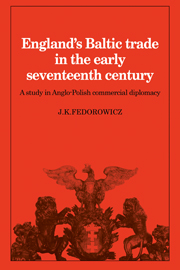 England's Baltic Trade in the Early Seventeenth Century
England's Baltic Trade in the Early Seventeenth Century Book contents
- Frontmatter
- Contents
- Preface
- List of maps and graphs
- List of abbreviations
- Map
- Introduction
- 1 English perceptions of the Polish Commonwealth
- 2 The mechanics of English diplomacy in the Eastland
- 3 The early history of the Eastland Staple at Elbing
- 4 The operation of the staple
- 5 The pattern of English shipping into the Baltic
- 6 English exports to the Baltic
- 7 English imports from the Baltic
- 8 The threat to the Eastland Staple at Elbing
- 9 The depression of 1620 and the crisis of England's Baltic trade
- 10 The political crisis, 1620–9
- 11 The mission of Sir Thomas Roe to the Eastland
- 12 Attempts at reconciliation with Danzig, 1630–5
- 13 The climax of English commercial diplomacy, 1635–42
- 14 Conclusion
- Notes
- Bibliography
- Index
8 - The threat to the Eastland Staple at Elbing
Published online by Cambridge University Press: 05 November 2011
- Frontmatter
- Contents
- Preface
- List of maps and graphs
- List of abbreviations
- Map
- Introduction
- 1 English perceptions of the Polish Commonwealth
- 2 The mechanics of English diplomacy in the Eastland
- 3 The early history of the Eastland Staple at Elbing
- 4 The operation of the staple
- 5 The pattern of English shipping into the Baltic
- 6 English exports to the Baltic
- 7 English imports from the Baltic
- 8 The threat to the Eastland Staple at Elbing
- 9 The depression of 1620 and the crisis of England's Baltic trade
- 10 The political crisis, 1620–9
- 11 The mission of Sir Thomas Roe to the Eastland
- 12 Attempts at reconciliation with Danzig, 1630–5
- 13 The climax of English commercial diplomacy, 1635–42
- 14 Conclusion
- Notes
- Bibliography
- Index
Summary
Challenges to the Elbing residence
The accession of James I and the success of the Cikowski embassy seemed to herald a period of close and amicable relations between the governments of Poland and England which in turn held out hope for commercial stabilization and expansion. However, the evidence in chapters 6 and 7 shows the irregularities of the commercial relationship and the ultimate deterioration of English commercial interest in Poland. Following the optimism of 1604 a series of convulsions and setbacks occurred with relentless regularity to bring about the final collapse of English trade to Poland in the 1650s. The rest of this work will describe these shocks and their results.
The first setback to the English position occurred almost immediately after Cikowski returned to Poland from his English embassy and it took the form of a growing campaign against the English residence at Elbing. This obviously originated with Danzig, which stood to lose greatly in any agreement between the Polish and English governments, largely because of the resulting growth of Elbing's commerce and the consequent threat to Danzig's virtual monopoly of Polish sea trade with western Europe. Thus the staple residence of the Eastland Company at Elbing was the first target of Danzig's assault.
Even before Cikowski's mission to England, Danzig had begun to use its influence at the Polish court to undermine Polish regard for the English merchants. It complained to Sigismund that the Eastland Company was consistently breaking and ignoring Polish laws by setting up its own courts, by fixing prices through its monopoly on cloth imports to Poland and by importing faulty merchandise.
- Type
- Chapter
- Information
- England's Baltic Trade in the Early Seventeenth CenturyA Study in Anglo-Polish Commercial Diplomacy, pp. 132 - 157Publisher: Cambridge University PressPrint publication year: 1980


